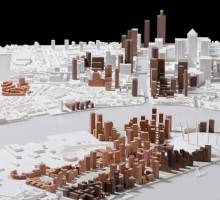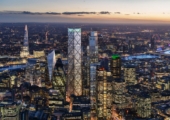April 7, 2015
New masterplan submitted for £5bn East London development
 Developers have submitted a revised masterplan for the £5 billion Greenwich Peninsula mixed use development in East London. The new plans not only increase the number of homes on site but also include a greater focus on digital arts and media studios as well as more high rise buildings in keeping with London’s current predilection for tall buildings and emphasising the shift in London’s centre of gravity eastwards. The original plan, created by Farrell & Partners and dating back to 2004 are described as outdated by developers Knight Dragon, who have submitted the new mixed use plan for around 15,000 dwellings, 59,000 sq.m. of hotel, retail and recreational space and 60,000 sq.m. of office space as well as a design district, space for healthcare buildings, educational facilities, transport hubs, visitor attractions, parking, cycling paths, community facilities and parks.
Developers have submitted a revised masterplan for the £5 billion Greenwich Peninsula mixed use development in East London. The new plans not only increase the number of homes on site but also include a greater focus on digital arts and media studios as well as more high rise buildings in keeping with London’s current predilection for tall buildings and emphasising the shift in London’s centre of gravity eastwards. The original plan, created by Farrell & Partners and dating back to 2004 are described as outdated by developers Knight Dragon, who have submitted the new mixed use plan for around 15,000 dwellings, 59,000 sq.m. of hotel, retail and recreational space and 60,000 sq.m. of office space as well as a design district, space for healthcare buildings, educational facilities, transport hubs, visitor attractions, parking, cycling paths, community facilities and parks.




























March 24, 2015
Film: The Japanese workers who withdraw to live in Internet cafes
by Mark Eltringham • Comment, Flexible working, Technology
Japanese workers appear to manifest some of the most extreme reactions to the challenges of modern life. Often these are related to the uncertainties of work and the fracturing of time and space associated with contemporary working life. Two of the most common characteristics of the Japanese response appears to be isolation and exclusion. Recently, the Japanese Government investigated the phenomenon of banishment rooms which some firms are alleged to have used to exclude unwanted employees. There has also been a great deal of talk about hikikomori, those people who lock themselves away from the rest of the world, estimated to be up to 1 percent of the population. Now, a new film from Shiho Fukada tells the story of two Japanese men who have taken to living in Internet cafes as they seek to find their way in life.
More →